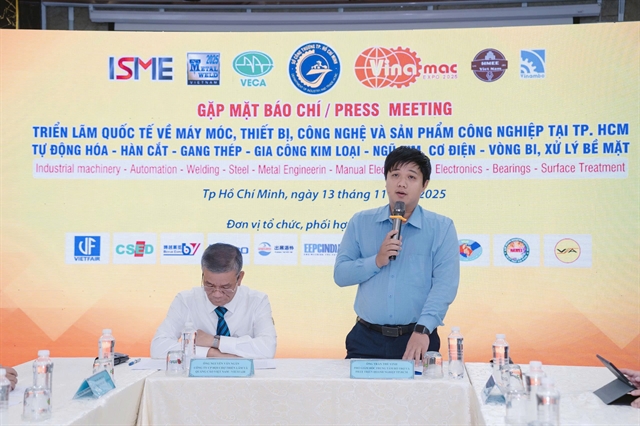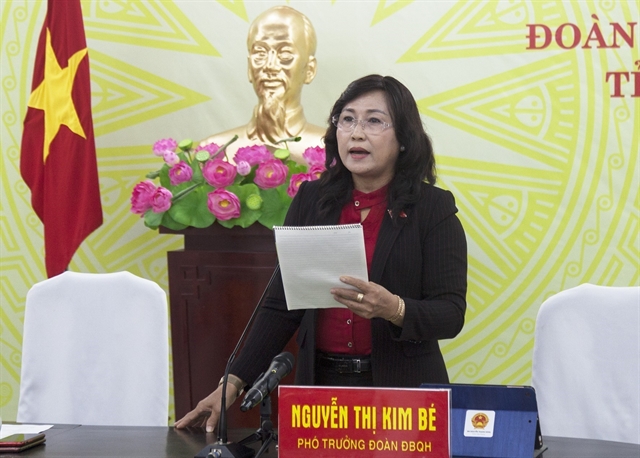 Politics & Law
Politics & Law

National Assembly deputies aired their grievances about the Government's failure to submit draft laws for parliamentary review in line with the agenda, during a discussion held on Friday to look at legislative building for 2020-21.

|
| Nguyễn Thị Kim Bé, National Assembly deputy from Kiên Giang Province. — VNA/VNS Photo Thành Đạt |
H̀À NỘI — National Assembly (NA) deputies aired their grievances about the Government's failure to submit draft laws for parliamentary review in line with the agenda, during a discussion held on Friday to look at legislative building for 2020-21.
Most of the complaints were regarding the Government’s abrupt request to modify an already-approved agenda and withdraw a legal project due to lack of preparation, while including new projects for review with the NA plenary session just around the corner, giving legislators limited time to fully consider their pros and cons.
Triệu Thị Thu Phương, a deputy from Bắc Kan Province, said that in 2019 the Government wanted to add nine draft bills and delay the submission of four draft bills, not to mention a number of other bills that they wanted to withdraw completely from the agenda.
The ministries and agencies in charge of drafting the laws were also late in sending the related documents and files to the NA delegations, Phương continued.
Even with discussions for the Law on Promulgation of Legal Normative Law, the Amended Enterprise Law, and the Law on Construction set for next week, NA deputies are still waiting for the latest revisions from the Government.
Sharing Phương’s opinion, Nguyễn Thị Kim Bé from Kiên Giang Province said that while the legislative agenda for 2020 and 2021 was built with more consideration for flexibility and openness, and the overall preparedness was commendable, there were still areas that needed to improve.
Land law delays
Deputy Bé also specifically called for accountability from those in charge of the much-anticipated amended Law on Land, which was requested to be pulled from the agenda altogether on the grounds of insufficient preparations after it was postponed from the discussions at the previous sitting of the NA.
The law and management issues are directly related to people’s property and land. The lion’s shares of legal complaints from the public were to do with land disputes, Bé said, attributing the issue to the opaque land legal framework in addition to inadequate capacity among State agencies.
Deputy Vũ Tiến Lộc from Thái Bình Province also expressed regret over the setbacks to the land law, saying that land was a huge resource for national development while the current law was simply not satisfactory.
Lộc asked to expedite the progress of the law, even making this a central task for the NA’s legislative agenda.
Responding to queries from NA deputies, Minister of Justice Lê Thành Long said the agency in charge – the Ministry of Natural Resources and Environment – had not “invested maximum efforts” in formulating the law.
However, a year ago, the Central Committee of the Communist Party of Việt Nam passed a Resolution on land policy renovation, and a review of this Resolution will be conducted in 2021, which means that the land law will also have to wait until the assessments and public feedback are in.
As per an approved programme, at the 9th sitting this May, the NA will review and adopt 10 draft laws that were debated at the 8th sitting in October last year along with the legislative agenda for 2021, and discuss seven other legal projects.
International agreement law
The draft Law on International Agreements was debated earlier the same day.
Deputy Minister and Foreign Minister Phạm Bình Minh said the issuance of the law was necessary.
The bill consists of seven chapters with 53 articles, stipulating the jurisdiction, order, and procedures for signing, amending, supplementing, extending, ending the validity, and suspending the implementation of international agreements.
The enactment of the law will create the legal basis for the institutionalisation of the Party’s guidelines on international integration.
The law will adjust regulations on signing international agreements in accordance with newly promulgated and amended laws, namely the 2014 Law on Organisation of the National Assembly, 2015 Law on Local Administration, 2016 Law on International Treaties and 2017 Law on Public Debt Management.
It also replaces the ordinance on the signing and implementation of international agreements which was approved by the NA Standing Committee and has served a legal foundation since 2007 has now proved to be outdated in the new context, he said.
While agreeing that the draft law is relevant to the 2013 Constitution and international agreements that Việt Nam is a member of, many NA deputies said it was necessary to clarify the nature of the international agreements to serve as a basis for determining the scope of the Law, avoiding overlapping with the 2016 International Treaties Law as well as ensure consistency between the provisions of this draft law and the legal system.
There is certain binding at different levels between the parties involved in any international commitment, they said.
When accepting the binding of an international agreement, it was natural to accept the rights and obligations of the signatory, especially when the signatory includes the State and the Government. This will overlap with the provisions of the 2016 International Treaties Law.
The law and ordinance making programme for 2020 and 2021 was also discussed by the NA on Friday.
Presenting the ordinance making programme, Chairman of the NA’s Committee for Legal Affairs Hoàng Thanh Tùng said although progress had been made in law making work, there remained shortcomings which should be solved. — VNS